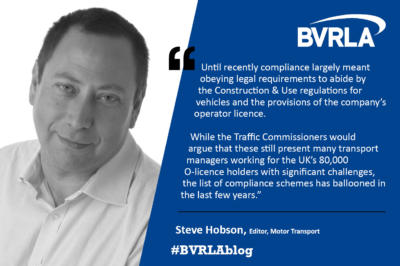Motor Transport Editor and freight industry expert, Steve Hobson explains why the road freight transport industry could be said to be a ‘3C’ industry.
The road freight transport industry could be said to be a ‘3C’ industry – the three Cs being cost, compliance and competition.

Until recently compliance largely meant obeying legal requirements to abide by the Construction & Use regulations for vehicles and the provisions of the company’s operator licence. While the Traffic Commissioners would argue that these still present many transport managers working for the UK’s 80,000 O-licence holders with significant challenges, the list of compliance schemes has ballooned in the last few years. FORS, CLOCS, DVS, LEZs, CAZs – Google the acronyms if they aren’t familiar – are just some of the accreditation schemes that operators have to comply with to if they want to work for certain clients in a growing number of cities.
Which brings us onto cost. Investing in new vehicles to comply with all these schemes is putting severe pressure on operators which are already struggling with low profitability. Euro-6 diesel trucks aren’t exactly cheap but, as the industry starts the painful journey towards 2050 and net-zero carbon emissions, the investment required in clean technology will be eye-watering. Biofuels, natural gas and electricity are not exactly new but with only 1% of the 310,000 vans sold last year being electric the scale of the transformation facing the industry in the next 30 years is vast. This change is taking place against a backdrop of the inexorable shift in UK shopping habits away from the high street towards shopping online. Yes the stuff still needs moving but the drift away from full loads delivered to shops from large distribution centres to an Amazon model of home delivery by an army of van couriers is a fundamental change in business model for many hauliers.
The other cost that is going to rise is wages. While stories of a 50,000 shortage of HGV drivers may be exaggerated – after all, the last Christmas peak passed without a hitch – there is no doubt that Brexit has had an impact on the number of European drivers and warehouse staff working in the UK. This has probably more to do with the drop in the value in the pound than being made to feel unwelcome by the 2026 referendum but the effect is the same – with young Brits showing little inclination to want to drive a truck or a fork lift, and Europeans seeing a drop in the real value of their earnings, wages are going to have to rise to recruit and retain the 2 million people employed in logistics.
Arguably the lack of profitability that makes cost increases associated with new vehicle technology and skills shortages such as problem is down to the third C – competition. Despite the enormous weight of regulation pressing down on HGV operators it is still a highly competitive sector. Profit margins for the Motor Transport Top 100 hauliers are still hovering around 2% and only the most efficient survive let alone thrive. In this environment it gets ever harder to find the money to invest for clean, green fleets run by a well-paid, highly motivated workforce. Customers of the transport industry find it all too easy to play hauliers off against each other in contract negotiations so in recent years costs have risen faster than rates. This will have to change if the huge sums of money needed to decarbonise road transport are to be found. It is no wonder that the vast majority of logistics firms are in private ownership rather than listed on the stock market – few institutional investors would take the long term view or accept the high risks and low rewards associated with owning a business in this 3C industry.
Members can also read the BVRLA's Commercial Vehicle Industry Outlook Report 2020.





